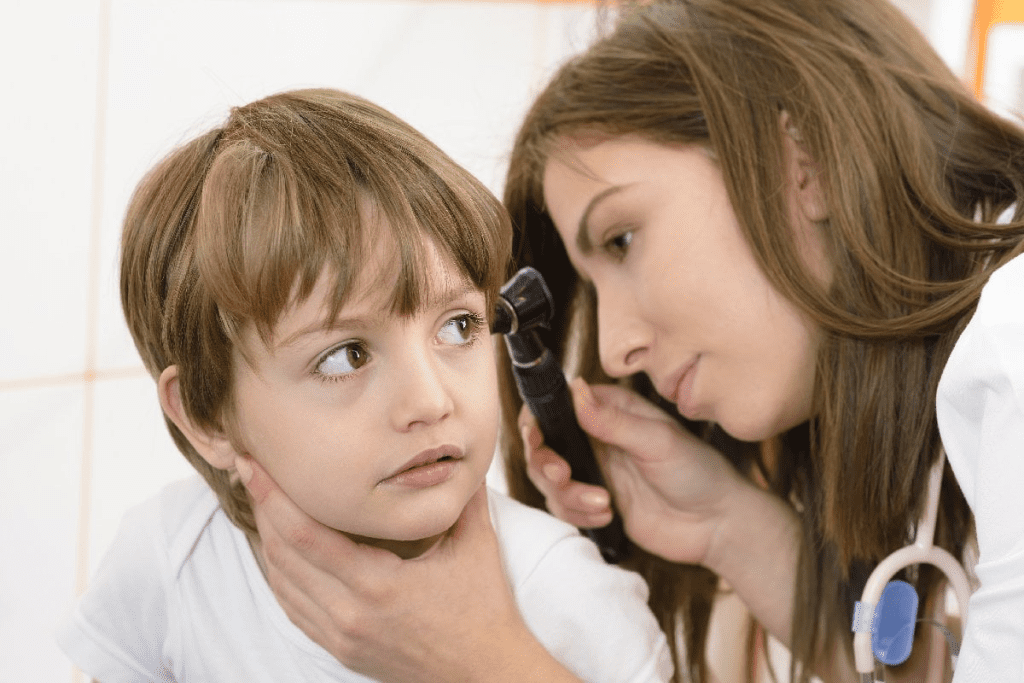We often think of dizziness as an inner ear problem. But, ear infections can also cause balance issues. The ear is key for hearing and balance. An ear infection can mess with these, leading to vertigo and dizziness.

Research shows many with chronic ear infections feel dizzy. This shows how ear health affects our balance. For example, labyrinthitis, an inner ear issue, can cause severe dizziness. Knowing how ear infections and dizziness are linked is important for finding relief.
Key Takeaways
- Ear infections can significantly impact balance and cause dizziness.
- The connection between the ear’s hearing and balance systems explains why ear infections often lead to dizziness.
- Inner ear infections, such as labyrinthitis, are known to cause vertigo and balance problems.
- A substantial number of individuals with chronic ear infections report experiencing dizziness.
- Understanding ear infection symptoms is key to addressing related dizziness and balance issues.
Understanding the Ear’s Anatomy and Balance System
The ear’s complex design is vital for grasping how inner ear infections lead to dizziness. It’s split into three main sections: the outer ear, middle ear, and inner ear. The inner ear is home to the parts that handle both hearing and balance.

How Your Ear Controls Balance
The inner ear has the labyrinth, a detailed structure with the cochlea and the vestibular system. The cochlea deals with hearing, while the vestibular system is key for balance and equilibrium. It tracks head movements and sends signals to the brain for balance.
The Connection Between Hearing and Equilibrium
The ear plays a dual role in hearing and balance, showing its complex design. The vestibular system works with the visual and muscular systems for balance. An inner ear infection can upset this balance, causing dizziness and vertigo.
Vestibular System Components
The vestibular system has three semicircular canals and the otolith organs (utricle and saccule). The semicircular canals detect rotational movements with fluid and hair cells. The otolith organs have sensory hair cells with otoconia for linear acceleration and gravity changes. These parts help the brain keep us balanced.
Types of Ear Infections That May Cause Dizziness
Ear infections can cause dizziness because of how they affect the ear and balance. The ear is key to keeping us balanced. Infections in different parts of the ear can disrupt this balance in different ways.

Middle Ear Infections (Otitis Media)
Middle ear infections, or otitis media, happen when bacteria or viruses infect the middle ear. This causes inflammation and fluid buildup. It’s common, mainly in kids, and can lead to ear pain, fever, and hearing loss.
In some cases, otitis media can also cause dizziness. This is because pressure and fluid can affect the inner ear’s balance structures.
Symptoms of otitis media may include:
- Ear pain or discomfort
- Fever
- Hearing loss or muffled hearing
- Dizziness or loss of balance
Inner Ear Infections (Labyrinthitis)
Labyrinthitis is an inner ear infection that affects the labyrinth. This is a key part of the balance system. It can be caused by viruses or bacteria and leads to severe dizziness, hearing loss, and tinnitus.
Common symptoms of labyrinthitis include:
- Severe dizziness or vertigo
- Hearing loss
- Tinnitus
- Nausea and vomiting
Vestibular Neuritis
Vestibular neuritis affects the vestibular nerve. This nerve sends balance information from the inner ear to the brain. It’s often caused by a viral infection and leads to sudden dizziness or vertigo without hearing loss.
Symptoms of vestibular neuritis may include:
- Sudden onset of dizziness or vertigo
- Nausea and vomiting
- Balance problems
- Difficulty walking
Knowing about the different ear infections that can cause dizziness is important. If you’re experiencing persistent or severe dizziness with ear infection symptoms, see a healthcare professional. They can help diagnose and treat the issue.
Recognizing Ear Infection Symptoms and Their Link to Dizziness
Knowing the signs of ear infections is key to understanding their link to dizziness. Ear infections can show up in different ways. Their symptoms can really affect a person’s life.
Common Signs of Ear Infections
Ear infections often have symptoms like earache, hearing loss, and discharge. Some people might also hear tinnitus, or a ringing in their ears. These symptoms happen because of inflammation and fluid buildup in the ear.
The symptoms of an ear infection can change based on where the infection is. Middle ear infections (otitis media) usually cause ear pain and hearing loss. Inner ear infections (labyrinthitis) can lead to dizziness and balance problems.
How Inflammation Affects Balance
Inflammation in the ear can mess with the vestibular system. This system is key for balance. It’s in the inner ear and helps detect changes in head position and movement.
The link between ear infections and dizziness comes from the ear’s anatomy. The inner ear has both the auditory system (for hearing) and the vestibular system (for balance). When this area gets infected, it can mess up balance.
Statistical Evidence Connecting Ear Infections and Dizziness
Research shows a strong link between ear infections and dizziness. For example, over 56% of people with chronic otitis media say they have at least mild dizziness. Also, 44“59.5% have vestibular symptoms. This statistical evidence shows a clear connection between ear infections and balance problems.
It’s important to understand this link for diagnosis and treatment. Doctors should think about ear infections when they see patients with dizziness. This is true if the patients also have other ear symptoms.
Diagnosis and Medical Assessment
Getting a proper diagnosis is key when we feel dizzy because of ear infections. It helps doctors know how to treat us. When we see a doctor, they check our symptoms and run tests to find out why we’re dizzy.
When to Seek Medical Attention
If our dizziness doesn’t go away or is very bad, we need to see a doctor. People who have had ear infections before should also see a doctor. Early treatment can stop serious problems.
Here are some signs we should see a doctor:
- Persistent dizziness or vertigo
- Severe ear pain
- Fever or discharge from the ear
- Hearing loss or tinnitus
Diagnostic Tests and Procedures
Doctors use different tests to find out if we have an ear infection and how it affects our balance. These tests include:
- Hearing tests (audiometry) to check our hearing
- Vestibular function tests (electronystagmography or videonystagmography) to test our balance
- Imaging studies (CT or MRI scans) to see the inner ear
These tests help doctors understand how bad the ear infection is and how it affects our balance.
Differentiating Ear Infection Dizziness from Other Causes
It’s important to know if our dizziness is from an ear infection or something else like BPPV or Meniere’s disease. A detailed medical check-up is needed to find out why we’re dizzy. Doctors use our medical history, physical exam, and test results to figure out what’s causing our symptoms. Then, they can create a good treatment plan for us.
Treatment Options and Prevention Strategies
It’s important to treat ear infections well to stop symptoms like dizziness. We’ll look at medical treatments, ways to manage dizziness, and how to prevent infections.
Medical Treatments for Ear Infections
Doctors use different medicines and therapies to treat ear infections. Corticosteroids can reduce swelling, and antiemetics help with dizziness and nausea. Sometimes, antibiotics are needed if the infection is bacterial.
Vestibular rehabilitation therapy (VRT) is also helpful. It’s a physical therapy for inner ear problems. VRT can improve balance and lessen dizziness.
Managing Dizziness Symptoms
It’s key to manage dizziness when treating ear infections. We use VRT, lifestyle changes, and sometimes medicine. This helps patients balance better and lowers fall risks.
Changing your lifestyle can also help. Avoid things that make dizziness worse and do exercises that improve balance.
Preventing Recurrent Ear Infections
To stop ear infections from coming back, we need to be proactive. We tell patients to stay clean, avoid smoking, and get vaccinated. For those who get infections often, we might suggest more steps, like tympanostomy tubes.
- Practice good ear hygiene
- Avoid secondhand smoke
- Consider relevant vaccinations
- Follow-up appointments with an ENT specialist
Long-term Management for Chronic Cases
For chronic ear infections, long-term care is essential. We create a plan for each patient. This might include regular check-ups, medicine, and lifestyle changes. Our goal is to reduce symptoms, avoid problems, and improve life quality.
Knowing about treatment and prevention helps us manage ear infections and dizziness. This improves health outcomes.
Conclusion
It’s important to know how ear infections and dizziness are connected. We’ve looked at how middle and inner ear infections can affect our balance. This happens because they impact the vestibular system.
Spotting the signs of ear infections and their link to dizziness is key. If you’re feeling dizzy a lot or have other symptoms, you should see a doctor. They can help figure out what’s wrong and treat it.
Learning about ear infection-related dizziness helps us manage and prevent it. This knowledge lets us find better ways to treat and avoid these issues. By doing so, we can improve our lives and stay balanced.
FAQ’s:
Can ear infections cause dizziness and balance problems?
Yes, ear infections can lead to dizziness and balance issues. This is because the ear’s hearing and balance systems are connected. Inflammation from an infection can harm the vestibular system, causing dizziness and balance problems.
What are the common signs of an ear infection?
Signs of an ear infection include ear pain, hearing loss, fever, and discharge. Dizziness, vertigo, and balance problems can also occur.
How do inner ear infections (labyrinthitis) affect balance?
Inner ear infections, like labyrinthitis, can severely affect balance and cause dizziness. This is because they inflame the inner ear structures that help with balance.
What diagnostic tests are used to assess ear infections?
Tests for ear infections include hearing tests and tympanometry. Imaging studies like CT or MRI scans and balance assessments are also used. These help determine the infection’s impact on balance and hearing.
How are ear infection-related dizziness and balance problems treated?
Treatment for these problems may include medications for symptoms. Antibiotics or antivirals are used to treat the infection. Vestibular rehabilitation therapy can also help improve balance and reduce dizziness.
Can recurrent ear infections be prevented?
Yes, preventing recurrent ear infections is possible. Good hygiene, avoiding secondhand smoke, and getting recommended vaccinations are key strategies.
When should I seek medical attention for ear infection symptoms?
Seek medical help for severe ear pain, fever, discharge, hearing loss, or significant dizziness and balance problems. These can be signs of a serious infection.
How do healthcare professionals differentiate ear infection dizziness from other causes?
Healthcare professionals use a medical history, physical exam, and diagnostic tests to distinguish ear infection dizziness from other causes. Tests like hearing and balance assessments help find the root cause of dizziness.
References
- Tailor, B. V., et al. (2021). Presentation of dizziness in individuals with chronic otitis media. Frontiers in Neurology / PMC.https://www.ncbi.nlm.nih.gov/pmc/articles/PMC8294833/








